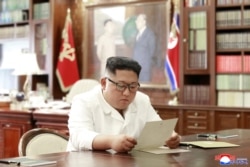The U.S. Senate on Thursday approved a massive yearly authorization for America's armed forces that includes a new round of sanctions against North Korea and comes amid fulsome debate on President Donald Trump's latitude to take military action against Iran. The vote was 86-8.
The National Defense Authorization Act budgets $750 billion for the Pentagon for the 2020 fiscal year, which begins in October, up from $716 billion this year.
The bill allows for the full universe of activities conducted by the branches of America's armed forces. In addition, it authorizes the creation of a U.S. Space Force at the behest of the Trump administration, mandates cybersecurity initiatives and sets forth a 3.1% pay raise for military personnel.
"It would be difficult to overstate the importance of this legislation to the ongoing missions of our nation's men and women in uniform," said Senate Majority Leader Mitch McConnell, a Kentucky Republican, calling the NDAA "a declaration to both our allies and adversaries of America's strategic resolve."
Folded into the bill are numerous provisions relating to national defense but separate from the Pentagon, such as new economic pressure against North Korea in hopes of forcing Pyongyang to abandon its nuclear ambitions.
Under the bipartisan measure, entities doing business with North Korea would be blocked from the U.S. banking system. In 2010, Congress approved similar sanctions against Iran that were widely believed to have compelled Tehran to the negotiating table over its nuclear program.
"We're sending a very clear message: You can do business with North Korea or you can do business with the United States," Democratic Sen. Chris Van Hollen of Maryland said. "But if you choose North Korea, you can't do business here and you will be held to account."
"For decades, negotiations with the North Korean regime have been gamed by the North Koreans," Pennsylvania Republican Sen. Pat Toomey said. "They are developing nuclear weapons and ballistic missiles, and they have become a direct and growing threat to the U.S. mainland as well as, obviously, our allies."
Toomey added, "In my view, the only way we can hope to change North Korea is with crippling sanctions. The sanctions currently in place are not sufficient."
Congress took up new punitive measures as on-again, off-again nuclear discussions between the Trump administration and North Korea's regime appear in limbo.
Trump recently acknowledged receiving a personal letter from North Korean leader Kim Jong Un. On Thursday, however, Pyongyang's central news agency lashed out at the United States, hinting that nuclear talks might be halted.
Toomey said he did not expect resistance from the White House over the sanctions.
"My sense is that the administration recognizes that tougher sanctions against North Korea are a good thing and will strengthen their hand in the negotiation, should the day come when we have meaningful negotiations [with North Korea]," he said.
The punitive measure was named after Otto Warmbier, an American college student imprisoned in North Korea in 2016. He died shortly after being returned to the United States in a vegetative state in 2017.
Consideration of the NDAA has coincided with weeks of congressional debate over possible military confrontation with Iran, a debate made more heated after the Islamic nation shot down a U.S. military drone over the Strait of Hormuz earlier this month and Trump ordered additional U.S. troops to the Middle East.
Senate Democrats, joined by a few Republicans, had pressed for an amendment to the NDAA stipulating that Trump would need congressional authorization to order military action against Iran.
McConnell agreed to a vote on the measure, but not as part of the NDAA. The Senate is expected to vote on the proposal Friday.
The Senate's NDAA differs from a House version, likely requiring the formation of a bicameral committee to craft a unified bill that can pass both chambers.





